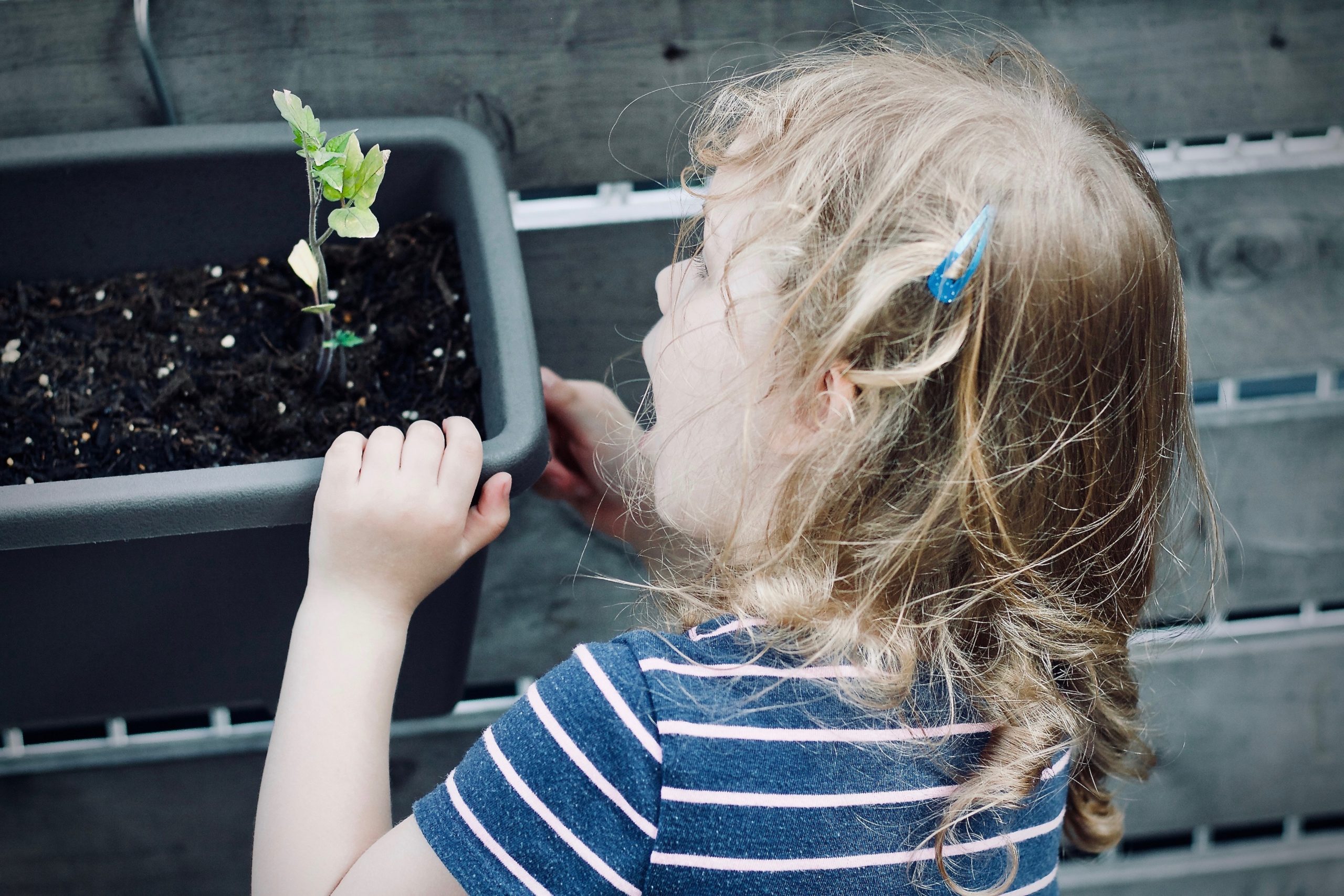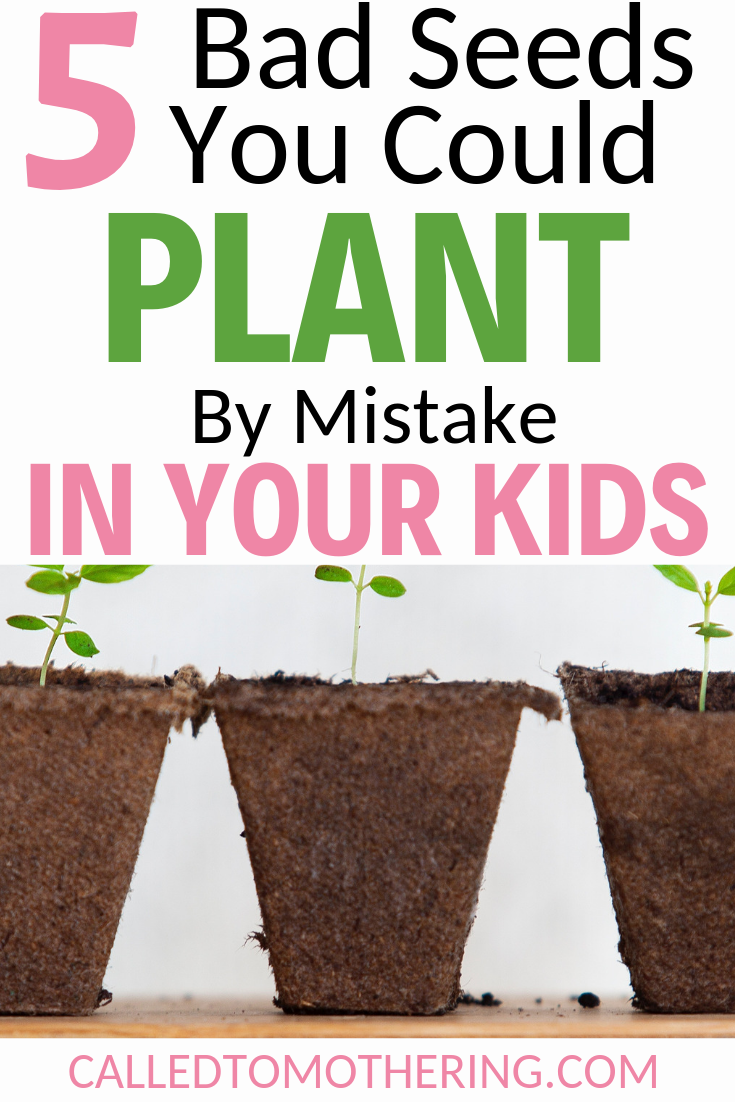
Parenting is like a front row seat to your own real life drama. As I watch my son and daughter interact with each other, experiencing life day in and day out, various scenes unfold right before my eyes. And these scenarios provide an excellent training ground for the formation of character, both theirs and mine.
I use these encounters to guide them towards right living now so they won’t have bigger problems later. Because certain “seeds”, if left unchecked, can develop into plants that are potentially dangerous.
For example, when my six-year-old daughter becomes enraged with her brother for something he did and refuses to forgive him. I don’t want that to become a habit she models 20 years from now as a wife.
Or when my son asks for a reason why before obeying. That wouldn’t bode well for him when he’s at his first job, and his employer makes several requests of him.
Then there are those seeds which can be planted and take root even when we’re doing the “right” things as parents. While we’re busy doing the common- but not necessarily best- parenting practices.
Before we know it, an unruly plant has sprouted, and we’re left wondering where it came from. Here are 5 seeds you may be planting without realizing it.

1. Legalism
We wisely teach our kids to honor God while they’re still little and set a standard of godliness in our homes. We want them to choose forms of dress, media and literature that glorify the Lord, as well as helps them maintain pure and righteous living.
The problem comes when we teach the application before the biblical principle.
For instance, you teach your daughter to dress modestly because you desire for her to be humble. When you head down to the mall, you inevitably see a group of young teenaged girls who apparently didn’t get the memo- and take things a step further by pointing them out to your child, saying you’re so glad she dresses differently.
A bigger problem than just immodesty can begin to develop here. While you’re attempting to bring about a form of humility on the outside by comparing your daughter with others, you end up inspiring a lack of humility inside your child’s heart instead.
As Christian parents, we should be vitally interested in the condition of our children’s hearts.
A good set of questions to ask yourself when you’re conflicted about a particular problem such as dress or music choice with your child is, “What do I really want out of this child? Am I only interested in a change of clothes? Or do I want a change of heart? Do I want my child to love God with all her heart, soul, mind, and strength?”
Over emphasis on external behavior will eventually lead to a lack of genuine faith and love.
2. Unbelief
Another potentially harmful seed can be planted when we choose not to make a big deal out of non-salvation issues, in order to avoid the ditch of legalism altogether. It’s good to “keep the main thing the main thing”.
However, we create more problems when we’re not actively talking with our kids about how a biblical worldview applies to real life.
We must teach our children how to view the world through a biblical lens. This means talking them through how we navigate scientific, historical, and social issues with the Bible as our primary instruction. Because the world will teach them how to view those things from a naturalist, anti-biblical point of view.
It has become popular in recent years to say things like, “The Bible is a book of theology, not a textbook.” But our faith should dominate and inform all of our responses to every situation we face in the world, not just a few specific ones (2 Corinthians 10:5). Otherwise, we’re inadvertently teaching our kids to trust other things above God’s Word.
I agree that one’s belief about the age of the earth or evolution isn’t a requirement for salvation. However, for the 60% of kids that leave their faith over this very thing, it becomes a salvation issue.
The fruit that develops is kids growing up thinking they can mix worldviews without consequence, until they realize they simply do not mix. And of course the worldview they stick with is the one they have been offered proof of.
Teaching kids that geology, biology, archaeology, and paleontology support instead of contradict scripture is the first step to digging out this invasive seed and planting a new one.

3. Entitlement
From the minute our children are placed in our arms, we vow that we’ll do anything for them. Unfortunately, “anything” ends up meaning their laundry and the cleaning up of their messes, usually for the duration of the time they live under our roof.
You know the deal- one minute you’re assigning chores; the next you find yourself picking up after a tornado swept through the house.
In an effort to make our kids feel loved and enjoy a carefree childhood, we end up tolerating laziness and absolving them from responsibility. But loved doesn’t equal “comfortable” or “happy”. And, contrary to popular opinion, children who perform age-appropriate duties aren’t overburdened.
Making excuses when they slack off in their schoolwork, double checking to make sure they’ve packed their lunch, and constantly reminding them to do their chores won’t do them any favors. Natural consequences can be one of life’s greatest teachers!
If you make your entire life revolve around your kids, they’ll grow up thinking everyone should cater to them. It puts them in charge and you at their beck and call.
And self-absorbed, entitled adults aren’t likely to step out of their comfort zones to serve others since they’re always thinking about how they can be served.
4. Discontent
The other night, my husband suggested to our children that they race each other to see who could get ready for bed faster. I was quick to put the kibosh on the idea, fearing my daughter’s reaction when she inevitably lost to her older brother.
What I didn’t realize was that I had developed a habit of removing any chance of her facing competition, based on her sensitive nature. I wanted to provide a “fair”, even playing field where no one loses or accidentally gets their feelings hurt.
We also plant this seed when we hurriedly replace the blue cup with the coveted red cup because our child whined for it. Or offer him another meal option if he’s complaining about the food we served. Because, pick your battles, right?
Wrong.
When you consistently protect your children from loss or failure, you create adults who can’t handle disappointment and have difficulty being happy for others. Catering to their sensitivity teaches them that their emotions, or sin, are someone else’s responsibility.
In real life, you don’t get a participation trophy just for showing up. Arranging everything in their lives to ensure a fair outcome will plant a jealous, complaining child who is rarely content and easily offended.

5. No fear of God
The world can be a big, scary place. There are things out there that can harm your kids, so you want your home to be a safe place for them to fall.
Part of maintaining parental authority is disciplining children. But maybe you don’t want to be “mean” by telling them they did something wrong and making them feel bad.
These days most of us don’t even want to speak phrases that would imply an obvious position of authority. Instead of saying, “Put on your shoes, we’re leaving the house in five minutes”, we now say, “I know you’re ready to leave when you’re sitting on the rug with your shoes on.”
On the surface, that sounds like peaceful, kind and patient parenting. The child doesn’t feel like he’s being given an order and he’s empowered to make his own choices.
Or we tell our kids to do something and then accept slow, rather than immediate obedience:
“After I finish this game/episode/chapter.”
“I’ll do it later/tomorrow/next year.”
But if you dig a little deeper, you come to the conclusion that giving kids options when it comes to obedience actually encourages them to decide when they should obey parents. And if imminent danger ever becomes a reality, you will be glad that obedience wasn’t an option for your child.
If you’re constantly sheltering them from the consequences of their actions, they won’t learn about the seriousness of sin and asking forgiveness.
It’s not the fun part, but it is necessary to guide children into becoming successful adults. If you don’t recognize your authority on the basis of the reverence of God, your child won’t learn to recognize God’s authority structure.
Let’s recognize the seeds that produce this kind of bad fruit in our children and start planting something different!
Be sure to also read: 6 Parenting Mistakes You Should Avoid

Oh my God! I have never seen it this way, I usually let my almost 4 year old daughter choose when to obey and do what I ask in her own way because I dont want a tantrum or make her cry. I even fight my husband when he tries to teach her discipline. I pray God help me, I am so wrong and actually hurting my daughter. Thank you for explaining so clear!
I’m so glad it was helpful, Gisel! I made the same mistakes with my own kids and saw the resulting bad fruit.
Hello sister Marisa,
Accidentally I came across this site and I read this post and I found it is really a different perspective of practical application of God’s word. And it really helped me..Thank you..
I’m so glad you stumbled upon the post and that it was helpful to you, Sara! Thanks so much for taking the time to read and leave a comment. 🙂
Wow Marisa! I have never heard it this way. This ministered to me greatly and by God’s grace, I will be making changes on the entitlement beliefs and legalism points. You are such a blessing to motherhood!
So glad the post ministered to your mom heart, Bola! I’m really honored that you would call me a blessing. You’ve got me choked up over here. 🙂
Thank you so much for this, very enlightening for me. I am a mother to a 3 year old son.